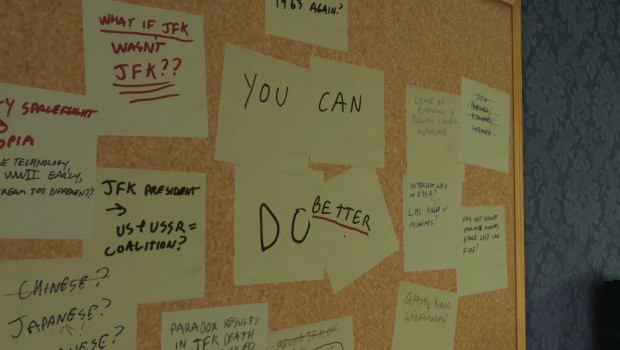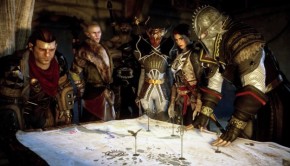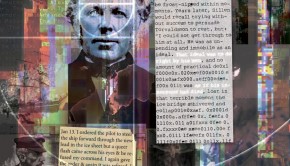Gone Home: Coming to See the Light
SPOILER WARNING: The following is an in-depth discussion of certain aspects of Gone Home and should not be read until after completing the game.
The player character of Gone Home is Kaitlyn Greenbriar. The center of the story is her sister Sam. But for a certain segment of the game’s audience, the most strongly identifiable figure might be Daniel Schutes, a lonely, emotionally needy young videogame enthusiast at the periphery of the narrative. Though Daniel’s role in the story is minor, the part he plays is instructive as to what a certain segment of the audience might aspire to be.
 Almost everything we know about Daniel comes to the player secondhand from Sam, who can clearly take him or leave him. “When you live in one place your whole life,” she says, “your next-door neighbor is kind of like, your default friend. And Daniel only got weirder over the years.” Judging from a note found in a closet, the Greenbriar and Schutes mothers were closer friends than their children. Moving further away from this “default friend” has been a source of relief for Sam, who won’t have to see him anymore.
Almost everything we know about Daniel comes to the player secondhand from Sam, who can clearly take him or leave him. “When you live in one place your whole life,” she says, “your next-door neighbor is kind of like, your default friend. And Daniel only got weirder over the years.” Judging from a note found in a closet, the Greenbriar and Schutes mothers were closer friends than their children. Moving further away from this “default friend” has been a source of relief for Sam, who won’t have to see him anymore.
It’s likely that one of the sources of Sam’s tension was putting up with Daniel’s awkward stabs at affection. There are hints of a childish puppy love between the two at a very young age, based on Daniel’s initial role as the First Mate in Sam’s long-running stories of the nautical pulp hero, Captain Allegra. (In a later story, Allegra refers to the First Mate as “the love of my life,” though at that point the role is decidedly no longer being written with Daniel in mind.) Daniel’s mother writes in a note to Janice Greenbriar that “He has missed having his friend Samantha in the neighborhood very much,” and that “She is welcome back to our house to visit anytime.” Sam’s own writing makes it clear that the affection isn’t mutual; one note protests that “The only reason I ever hung out with him in the first place is he had a Nintendo when we were little!”
(There’s a persistent and amusingly romantic aspect to videogames in Gone Home. Sam claims that she and Daniel were “together” because “he always did have the good Nintendo games,” while later in Sam’s life, her first evening spent with her new love interest Lonnie is at an arcade. On Lonnie’s first visit to Sam’s new home, Sam notes with relish that she showed her around the place “and took my revenge on Super Nintendo.”)
 As you explore the Greenbriar home, you find a couple more nagging reminders from Janice for Sam to call Daniel back, until you eventually hear a diary entry from Sam describing the end of her and Daniel’s story. “Daniel finally came over to get his game,” she starts. “I’d been dreading it…” Instead of keeping him at arm’s length, though, Sam finds herself unexpectedly confiding in him. “I told him about school and Dad and Lonnie… and then how sorry I was that I wasn’t his friend anymore.”
As you explore the Greenbriar home, you find a couple more nagging reminders from Janice for Sam to call Daniel back, until you eventually hear a diary entry from Sam describing the end of her and Daniel’s story. “Daniel finally came over to get his game,” she starts. “I’d been dreading it…” Instead of keeping him at arm’s length, though, Sam finds herself unexpectedly confiding in him. “I told him about school and Dad and Lonnie… and then how sorry I was that I wasn’t his friend anymore.”
Please don’t misunderstand. Despite the length of this piece, Daniel is an almost total nonentity in the story, which is about Sam and her relationship with Lonnie. But in this moment, Daniel has power. He has come to Sam’s house, perhaps in the hopes of rekindling their friendship—or maybe even their relationship—and here Sam is, reaching out to him. He has the choice to be cruel or to be kind in response. And cruelty doesn’t necessarily mean spitting in Sam’s face, denouncing her friendship and storming off with his Street Fighter cartridge. We may not know much about Daniel, but what we do know puts him precariously on the cusp of being a Nice Guy. Cruelty in this instance could be nothing more than taking the final step off that precipice and meting out insincere support in exchange for emotional ransom. Cruelty could easily just be kindness with a price.
But Daniel chooses otherwise. Sam confides in him her true self, and in that moment the scales fall from his eyes and he sees her as she is. Although they lived next door to each other for many years, spending most of their lives as “default friends,” in a real sense we are hearing Sam’s account of them meeting for the first time. Daniel gives Sam a hug and tells her it’s going to be okay. “And for some reason,” Sam, who is no fool, says, “I almost believed him.”
With that, Daniel’s part in the story is done. We don’t see or hear from him again, nor do we learn whether his service as an ally made an difference in Sam’s well-being. If we could somehow ask him, he would probably say it doesn’t matter, because that moment, like Gone Home’s story, is not about him.
 The scales that fell from his eyes were the cataracts of self-regard. His seeing there was more at stake in that kitchen on that afternoon than his own status in Sam’s eyes was simultaneous with and inseparable from his seeing, at last, Sam. They say that the most important part of being an ally is learning to listen—which is actually on Samantha Allen’s list of Ways To React When Called Out rather than her Ways To Be An Ally, but for many clueless white guys like me and Daniel the two lists are pretty much interchangeable—but step number one is learning to see. For example, it’s not enough to be willing to humor a trans man or woman and call them by their desired pronoun. Until you learn to see them as what they are, you won’t be as much of a help to them as you might think.
The scales that fell from his eyes were the cataracts of self-regard. His seeing there was more at stake in that kitchen on that afternoon than his own status in Sam’s eyes was simultaneous with and inseparable from his seeing, at last, Sam. They say that the most important part of being an ally is learning to listen—which is actually on Samantha Allen’s list of Ways To React When Called Out rather than her Ways To Be An Ally, but for many clueless white guys like me and Daniel the two lists are pretty much interchangeable—but step number one is learning to see. For example, it’s not enough to be willing to humor a trans man or woman and call them by their desired pronoun. Until you learn to see them as what they are, you won’t be as much of a help to them as you might think.
And there are a lot of blinders in the world. One’s faith or politics or even occupation can get in the way of seeing clearly the pain it is our duty to do what we can to ease. Of seeing the people who need help and comfort past our own self-interest. And pride is no less a blinder than any other; self-congratulation at being such a good “ally” can occlude the damage we do as well as anything else. Many of us are only getting weirder over the years.
But it wasn’t too late for Daniel. Just as it isn’t ever too late for us either, as long as we have the will to see it.










